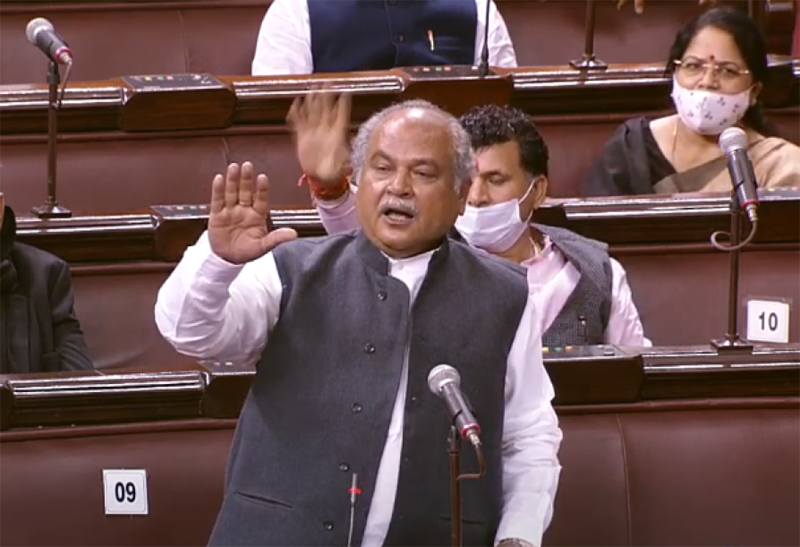
NEW DELHI, Feb 5: Putting up a strong defence of the new farm laws, Agriculture Minister Narendra Singh Tomar on Friday said the Government’s offer to amend them to assuage farmers’ sentiments did not mean they had any flaws and none from the protesting unions or their sympathisers have been able to point out any lacuna.
Countering the Opposition’s claim that farmers across the country are agitated over the three laws, he said in Rajya Sabha that peasants of just one state are being misinformed and instigated.
In an apparent reference to a booklet released by the Congress recently, the minister slammed the party saying: “Duniya janti hai pani se kheti hoti hai. Khun se kheti sirf Congress he kar sakte hai, BJP khun se kheti nahi kar sakti (The world knows water is required for farming. Only Congress can do farming using blood. BJP cannot do this)”.
Acknowledging that the three laws are currently a burning issue, the senior minister said Opposition parties criticised the Government and even termed the three legislations as “kala kanun” (black law).
“For two months I kept asking farmer unions what is kala in the laws so that I can try to rectify. But I could not get the answer… Also nobody (from opposition benches) tried to point out the provisions in the laws which are against farmers,” he said.
Tomar, along with two other union ministers has held 11 meetings with farmers’ representatives in wake of the ongoing protests. But the deadlock still continues.
Thousands of farmers, mainly from Punjab, Haryana and Wester Uttar Pradesh, are protesting at different borders of the national capital demanding repeal of The Farmers’ Produce Trade and Commerce (Promotion and Facilitation) Act, 2020, The Farmers (Empowerment and Protection) Agreement On Price Assurance and Farm Services Act, 2020 and The Essential Commodities (Amendment) Act, 2020. The Supreme Court has stayed their implementation till further order.
They are also demanding a legal guarantee of the minimum support price (MSP) for crops.
The Government, Tomar stressed, is committed to welfare of farmers and to the continuation of the ‘mandi’ system of procurement of crops on MSP-based mechanism.
The laws give farmers alternatives to sell their produce outside ‘mandis’, and unlike the State Government notified market places, such sale would not attract any tax, he said.
“The agitation should have been against the tax levied (by state government) on sale made in mandis but strangely the protests are against freeing of the system from such taxes,” he said, intervening during the discussion on a motion thanking the President for his address to the joint sitting of Lok Sabha and Rajya Sabha at the start of the Budget Session.
The Union Minister said that while the central law on contract farming free farmers from paying taxes on their sale and also empowers them to exit agreement with traders, as per the provisions of Punjab contract law, a farmer could be sent to jail or liable to pay penalty of up to Rs 5 lakh for violation of agreement.
“I also want to ask farmers, specially those from Punjab where norms are different, including commission for ahratiays,…We have freed farmers from tax and State Governments are levying taxes…So should the agitation be against those who are levying taxes or the one who is freeing them of taxes?
“Lekin desh mein ulti Ganga beh rahi hai (flow is against the tide),” Tomar said.
Referring to the law on farm trade, he said it allows farmers to sell their produce outside mandis, including from their own homes, warehouses and farm land. And there will be no state or central tax.
He also informed the House that there are state levies for trade inside APMC mandis. The central law is applicable outside the mandis and there are no taxes.
Tomar reiterated that the NDA Government and the leadership of Prime Minister Narendra Modi are fully committed towards farmers. He said the government has held several rounds of talks while respecting their protest.
He said farmers were asked to tell about problematic provisions in the laws and the government even tried to anticipate their concerns, like on continuation of APMC and offered solutions.
“We told them APMC system will not end. We gave them proposals. But at the same time I told them that if the government is ready to make amendments it should not be construed that there are shortcomings in the legislations,” he said. (PTI)

